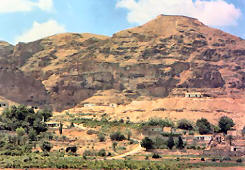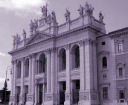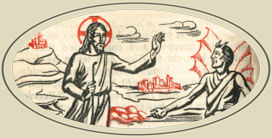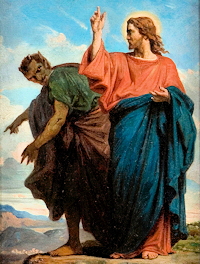Make your gift today!
Help keep Catholics around the world educated and informed.
Already donated? Log in to stop seeing these donation pop-ups.
» Enjoy our Liturgical Seasons series of e-books!
The scene of the temptation, which opens the public life of Jesus, declares in the Gospels in a very forceful manner the great change in our lives that He introduces into the world by His work of redemption. Where Adam fell, Christ, the new Head of humanity, triumphs over the power of Satan: at the time of His passion "the prince of this world" will be cast out. The Gospel of the temptation heralds Christ's victory in advance.
By appointing this Gospel for the beginning of Lent the Church proclaims that this victory should be ours also. In us, as all around us, it is Christ's temptation, Christ's struggle, Christ's victory which is prolonged; our effort is His and so is our strength; His will be our victory at Easter.
The Feast of St. Francis of Rome which is ordinarily celebrated today is superseded by the Sunday Liturgy.
Click here for commentary on the readings in the Extraordinary Form of the Roman Rite.
Sunday Readings
The first reading is from the Book of Genesis 2:7-9; 3:1-7 and is about the creation and fall of man.
The second reading is from St. Paul to the Romans 5:12-19. He is speaking of some of the immediate effects of Christian salvation, as brought to mankind by Christ. St. Paul stresses the fact that Christ through his death not only conquered sin but poured out divine grace so abundantly and lavishly on mankind, making them his brothers and therefore sons of God, that there is no comparison between the world redeemed by Christ's death and the world of sin which prevailed up to then.
The Gospel is from St. Matthew 4:1-11. This incident in our Lord's life, his forty days and nights of fasting followed by temptations, has been chosen as a reading for this first Sunday of Lent for our edification and encouragement. Lent is a period of preparation for the central Christian events of Good Friday and Easter Sunday. Christ, the Son of God in human nature, died the excruciating death of crucifixion on Good Friday, because of the sins of the human race. By this supreme act of obedience to his heavenly Father he made atonement for all our disobediences, and set us free from the slavery of Satan and of sin. In his resurrection his human nature was glorified by God the Father, and in that glorification we are all offered a share and given the right to an eternal life of glory, if we follow Christ faithfully in this life.
 For every sincere Christian therefore, who appreciates what Good Friday and Easter Sunday mean for her or him, this period of preparation should be a welcome opportunity. The Church no longer imposes on us any obligatory daily fasting from food, but it urges us to find other means of mortifying ourselves, so as to show that we realize what Christ has done for us and what he has earned for us through his passion, death and resurrection. The example of Christ fasting from food for forty days, should move even the coldest Christian heart to try to do something to make reparation for past negligence and sins. Christ had no sin to atone for; it was for our sins that he mortified himself. We all have much to atone for. If, because of the demands of our present way of life, we cannot fast rigorously as our grandparents did, we can find many other less noticeable, but maybe nonetheless difficult, ways of subduing our human worldly inclinations. Where there is a will there is a way; the willing Christian will find ready substitutes for fasting.
For every sincere Christian therefore, who appreciates what Good Friday and Easter Sunday mean for her or him, this period of preparation should be a welcome opportunity. The Church no longer imposes on us any obligatory daily fasting from food, but it urges us to find other means of mortifying ourselves, so as to show that we realize what Christ has done for us and what he has earned for us through his passion, death and resurrection. The example of Christ fasting from food for forty days, should move even the coldest Christian heart to try to do something to make reparation for past negligence and sins. Christ had no sin to atone for; it was for our sins that he mortified himself. We all have much to atone for. If, because of the demands of our present way of life, we cannot fast rigorously as our grandparents did, we can find many other less noticeable, but maybe nonetheless difficult, ways of subduing our human worldly inclinations. Where there is a will there is a way; the willing Christian will find ready substitutes for fasting.
The temptations, to which our Lord allowed himself to be submitted, are for us a source of encouragement and consolation. If our Lord and master under went temptation, we cannot and must not expect to live a Christian life without experiencing similar tests and trials. The three temptations Satan put to our Lord were suggestions to forget his purpose in life--his messianic mission of redemption. He was urged to get all the bodily comforts of life, all the self-glory which men could give him, and all the possessions and power this world has to offer.
Our basic temptations in life are the same: bodily comforts and pleasure, the empty esteem of our fellowman, wealth and power. There are millions of men and women on earth today—many of them nominal Christians—who have given in to these temptations and, are wasting their lives chasing after these unattainable shadows. But even should they manage to catch up with some of them, they soon find out that they are empty baubles. They will have to leave them so very soon.
Today, let each one of us look into his heart and honestly examine his reaction to these temptations. Do we imitate our Savior and leader, and say "begone Satan"? Our purpose in life is not to collect its treasures, its honors or its pleasures. We are here for a few short years, to merit the unending life which Christ has won for us. Would we be so foolish as to swap our inheritance for a mere mess of pottage (see Gen. 25:29-34)?
Lent is a golden opportunity to review our past and make sensible resolutions for our future.
Excerpted from The Sunday Readings by Fr. Kevin O'Sullivan, O.F.M.
Things to Do:
- Begin praying the prayer for the first week of Lent.
- Make Pease Porridge (Split Pea Soup) for supper, a traditional dish for Sundays during Lent. Add some diced ham for more flavor and substance.
- Today's Gospel speaks of the temptation of Jesus after his forty days' fast in the desert. After you go to Mass, discuss this reading with your children, emphasizing that temptation itself is not a sin, but we must use the Word of God to combat it, as Christ did. Read the Catholic Encyclopedia's explanation of the Temptation of Christ.

The Station today is at St. John Lateran. The Lateran is comprised of the Basilica, the Pontifical Palace and the Baptistry. The church is dedicated to the Christ the Savior. In the fifth century the titles of St. John Baptist and St. John the Evangelist were added. The Papal altar contains the wooden altar on which St. Peter is said to have celebrated Mass. This basilica is the mother of all churches and is the only church which has the title of Archbasilica.
Commentary for the Readings in the Extraordinary Form:
First Sunday of Lent
 "Not by bread alone does man live, but by every word that comes forth from the mouth of God" (Gospel).
"Not by bread alone does man live, but by every word that comes forth from the mouth of God" (Gospel).
1. In this picture the devil points to the bread of fleshly desire. "Now is the acceptable time" to "ration" our self-indulgence, our worship of physical culture (Epistle), and to feed our souls with the Divine Word. This temptation calls for the mortification of self.
2. The "pinnacle of the temple" (in the upper left corner), recalls the pride of usurping God's power, of trying to live beyond His reach. We must topple ourselves from the pinnacle of pride and lift ourselves up by prayer to the pinnacle of God Himself.
3. The "kingdoms of the world," seen in the distance (in middle of picture), represent those who covet mere earthly "glory." To offset this temptation there must be almsgiving or devoting one's talents to the service of one's neighbor.
The Epistle exhorts us not to receive "in vain" this plan of personal reformation, first by warning, then by encouraging us in the eternal struggle between Christ and Antichrist.
Excerpted from My Sunday Missal, Confraternity of the Precious Blood

First Sunday of Lent
Station with San Giovanni in Laterano (St. John Lateran)
The Station today is at St. John Lateran which is the seat of the Roman Pontiff, and the cathedral church for the Diocese of Rome. The official name of the basilica in Italian is Santissimo Salvatore e Santi Giovanni Battista ed Evangelista in Laterano. The Lateran is comprised of the Basilica, the Pontifical Palace and the Baptistry. The church is dedicated to the Christ the Savior. In the fifth century the titles of St. John Baptist and St. John the Evangelist were added. The Papal altar contains the wooden altar on which St. Peter is said to have celebrated Mass. This basilica is the mother of all churches and is the only church which has the title of Archbasilica.
Click here for a 360 degree virtual tour.
For more on San Giovanni in Laterano, see:
- Churches of Rome Info
- The Station Churches of Rome
- Rome Art Lover
- Roman Churches
- PNAC
- Aleteia
- Station Church
- The Catholic Traveler
For further information on the Station Churches, see The Stational Church.






